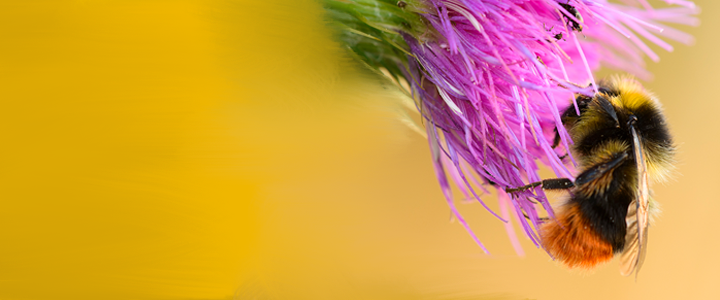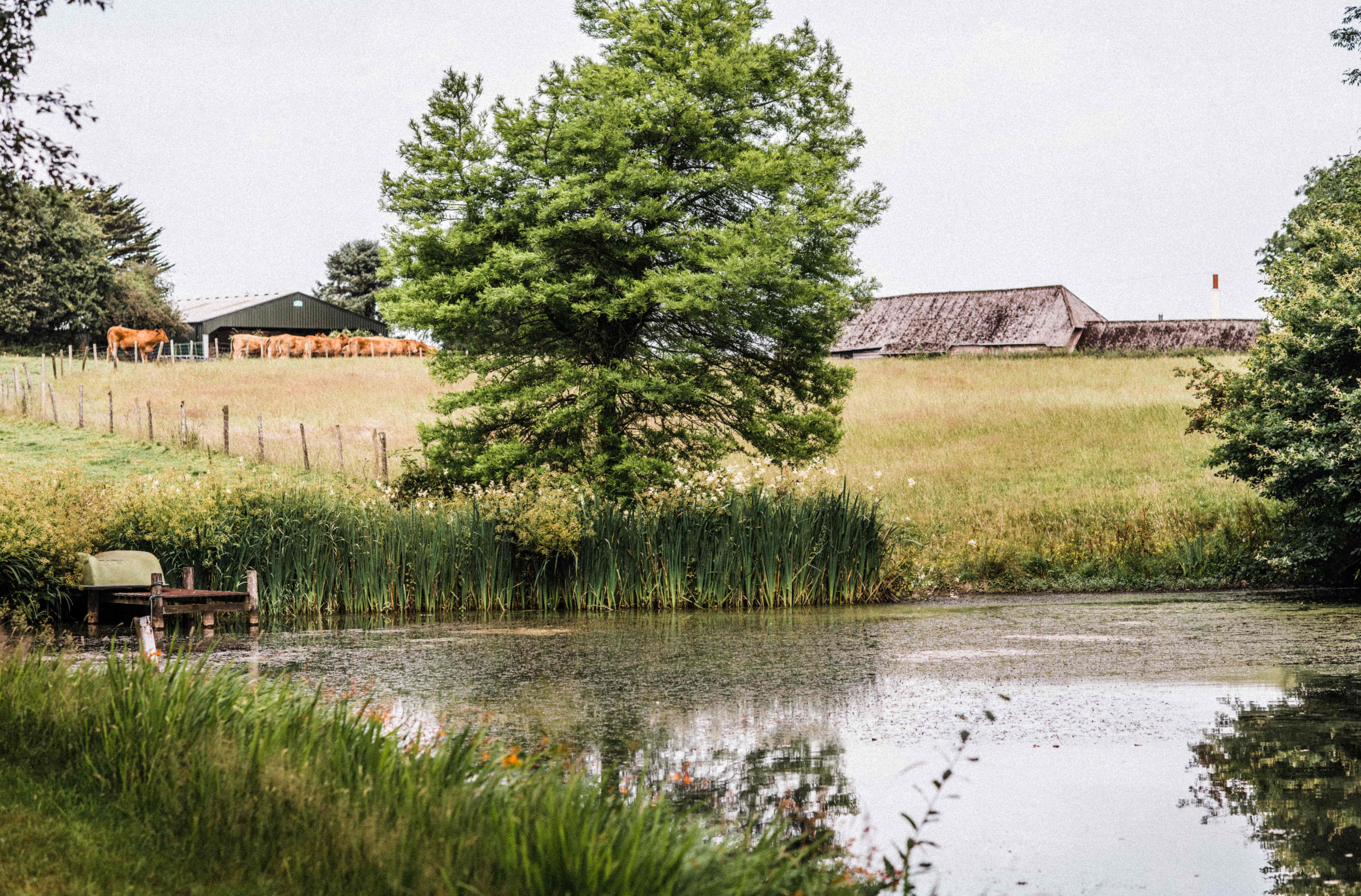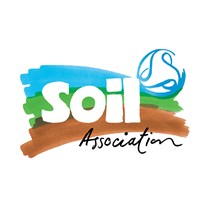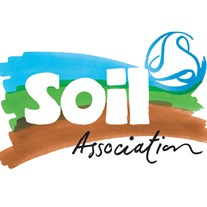
- Soil Association
- Take action
- Organic living
- Why organic?
- Organic farming is better for wildlife

Organic farming is better for wildlife
Organic farms are havens for wildlife
As a form of 'agroecology', working with nature to produce our food and managing the impact of farming on wildlife is at the heart of organic food production.
By working within nature's cycles and practicing environmentally sustainable land management, organic systems are designed to benefit wildlife and the natural world.
Opting for food that comes from organic farms is a great way to support a wealth of wildlife that provides food and homes for a multitude of species, including bees, birds and butterflies.
Read on to find out:
- why wildlife is under threat
- why it's so important that we protect our insects
- how organic farming can help support insects and other wildlife
Did you know that organic farms have on average 30% more biodiversity? [1] Organic farming is a great way to make our rural environments much more nature-friendly
Wildlife is under threat
41% of Britain's wildlife species have declined since 1970, and more than one in ten are currently facing extinction [2]. It's never been more important to protect our wildlife, especially insects.
We are losing insects eight times faster than mammals, birds and reptiles [3], and intensive farming practices is the main cause of their decline - a major global report states that insects could vanish within a century!
Habitat loss and pesticide use are key causes of wildlife decline
-
Habitat loss - Bees and other insects have lost much of their natural habitat in the past 60 years in the UK, including over 97% of wildflower meadows, as well as hedgerows and woodland. As well as supporting organic farmers, you can make a big difference for bees and pollinators at home by planting bee-friendly herbs and flowers in your garden.
-
Pesticide use - Pesticides are chemicals designed to kill insects and other pests. Farmers have become reliant on them and they've now found their way into our food, our soils, our rivers and our wildlife! Recent studies name the direct and indirect impacts of pesticides as key drivers of insect decline. Learn more about the impact of pesticides, and the alternatives.
Learn more about the threats affecting bees at the moment.

Why are insects important?
Not only are insects a vital part of a balanced ecosystem, providing food for other animals and cycling nutrients, they also play an essential role in our global food system.
Bees and other insects drink the sweet nectar of flowers. As they move between flowers, they transfer pollen which fertilises the plant, enabling it produce seeds - these insects are known as 'pollinators'. Three quarters of food crops depend on pollinators [4], and without them, we wouldn't have foods like potatoes, strawberries, tomatoes or coffee [5]!
Did you know that insect pollination is worth a mind-boggling £690 million to UK crops each year? Get buzzing with more amazing bee facts!

How do organic farms protect wildlife?
Fewer Pesticides
-
Organic farming uses virtually no pesticides. Instead, organic farmers must manage pests using natural methods, like crop rotations, and attracting beneficial insects (the natural predators of pests, like ladybirds, which eat aphids).
-
Organic farmers are permitted to use just 20 pesticides, compared to around 400 in non-organic farming. These 20 pesticides are derived from natural ingredients - things like citronella and clove oil, and are only permitted under very restricted circumstances.
Nature-friendly land use
-
Fostering biodiversity, protecting sensitive habitats, and working within natural systems are all key principles of organic food production. Organic farming aims to minimise disruption to the natural environment, producing food in a way that works with nature, not against it.
-
Maintenance of hedgerows, ponds and woodland are all part of being an organic farmer - in organic systems, these on-site natural resources benefit the farm too! Learn more about how we're helping farmers to plant more trees on their farms.
-
Did you know, that for every 10% increase in bee friendly habitats, like that found on organic farms, bee numbers and diversity increases on average by over a third [6]?

Promoting healthier soils
Wildlife doesn't just exist above ground - in fact, our soils are home to a quarter of the Earth's species, from worms and fungi, to tiny microorganisms! Did you know that one gram of soil may harbour up to 10 billion micro-organisms, most of which are still unexplored! Sadly, around half of pesticides used in the UK are fungicides, and these may be damaging this underground life, and the health of our soils.
Whether you have a window-box or an allotment plot, we can all make a difference for our soils - read our 5 top tips for saving soils at home.

-
Lowering the risk of plant disease, to reduce the need for fungicides in the first place.
-
Building soil fertility through composting and crop rotation, and using legumes to fix nitrogen, rather than energy-hungry synthetic fertilisers.
It is no surprise therefore, that organic farms have healthier soils, with more earthworms and a more diverse range of microbes living in the soil too.
-
Keep your soils healthy at home
Learn what you things you can plant in your green spaces at home to encourage healthy soils
Learn more
Supporting cleaner water for wildlife
The nitrogen fertilisers that are used in conventional farming can create 'ocean dead zones' which deprive life below water of vital oxygen. Organic standards ban the use of these fertilisers, so organic farming lowers the risk of pollution for wildlife in rivers and waterways too!
In light of our current biodiversity crisis, it’s never been more important that we rethink the way we produce our food. Agroecological farming systems, like organic offer real solutions to the decline of insects and other wildlife.
By reducing pesticide use, taking care of our soils and waterways and providing nature-friendly habitats, we can protect these vital species and harness their amazing benefits as part of an ecologically balanced farming system.
References
- ‘State of Nature 2019’ - The State of Nature partnership
- Sanchez-Bayo and Wyckhuys (2019) Worldwide decline of the entomofauna: A review of its drivers. Biological Conservation, 232, 8-27
- Klein et al. (2007), Proc. Biol. Sci. 274, 303.
- Wikipedia holds a list of crop plants pollinated by bees
- Kennedy et al. (2013) A global quantitative synthesis of local and landscape effects on wild bee pollinators in agroecosystems. Ecology Letters. Vol: 16 pp. 584–599.
-
Sign up for our email newsletter
Interested in hearing more about the benefits of organic and agroecology? Register for our email newsletter to be part of the movement for nature-friendly food and farming, and learn how you can make a difference
Sign up
